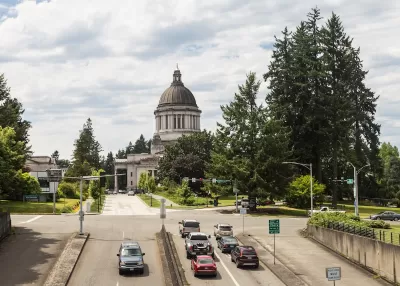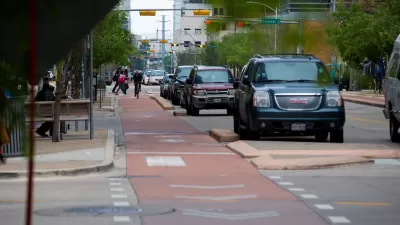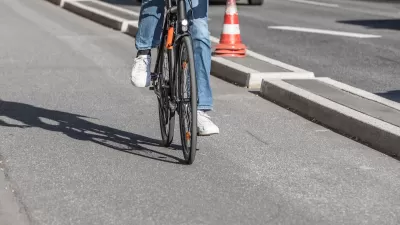The city’s comprehensive plan update could signal a shift in transportation planning priorities to a more comprehensive approach that ensures safer roads for all users.

The draft transportation section of Olympia, Washington’s proposed master plan update focuses on a Complete Streets approach that acknowledges the need to prioritize road safety for all types of road users.
Kameko Marquez explains the proposed changes in the Journal of Olympia, Lacey & Tumwater, noting that “The TMP also introduces a comprehensive ‘low-stress bike network,’ incorporating separated bike lanes on major roads and bike-friendly routes through quieter residential neighborhoods.” The plan calls for ensuring that all residents are within a quarter-mile of a designated bike route. In a meeting to discuss the plan, Olympia Planning Commissioners expressed support for additional bike infrastructure such as on-street bike corrals and e-bike charging stations.
Under the city’s Engineering Design and Development Standards (EDS), street projects are required to include sidewalks on both sides, as well as bike lanes on major roads. “Since 2023, the EDS standards have mandated that all new bike lanes must be either buffered or separated from vehicle traffic, a requirement that applies to both city-led and private development projects.”
The draft plan calls for using traffic modeling to reduce traffic lanes where appropriate. Senior Planner Michelle Swanson explained that “recent traffic models suggest lane reductions can be effective when paired with enhanced bike lanes, allowing traffic flow to be maintained.”

Alabama: Trump Terminates Settlements for Black Communities Harmed By Raw Sewage
Trump deemed the landmark civil rights agreement “illegal DEI and environmental justice policy.”

Study: Maui’s Plan to Convert Vacation Rentals to Long-Term Housing Could Cause Nearly $1 Billion Economic Loss
The plan would reduce visitor accommodation by 25% resulting in 1,900 jobs lost.

Planetizen Federal Action Tracker
A weekly monitor of how Trump’s orders and actions are impacting planners and planning in America.

Waymo Gets Permission to Map SF’s Market Street
If allowed to operate on the traffic-restricted street, Waymo’s autonomous taxis would have a leg up over ride-hailing competitors — and counter the city’s efforts to grow bike and pedestrian on the thoroughfare.

Parklet Symposium Highlights the Success of Shared Spaces
Parklets got a boost during the Covid-19 pandemic, when the concept was translated to outdoor dining programs that offered restaurants a lifeline during the shutdown.

Federal Homelessness Agency Places Entire Staff on Leave
The U.S. Interagency Council on Homelessness is the only federal agency dedicated to preventing and ending homelessness.
Urban Design for Planners 1: Software Tools
This six-course series explores essential urban design concepts using open source software and equips planners with the tools they need to participate fully in the urban design process.
Planning for Universal Design
Learn the tools for implementing Universal Design in planning regulations.
Caltrans
Smith Gee Studio
Institute for Housing and Urban Development Studies (IHS)
City of Grandview
Harvard GSD Executive Education
Toledo-Lucas County Plan Commissions
Salt Lake City
NYU Wagner Graduate School of Public Service





























